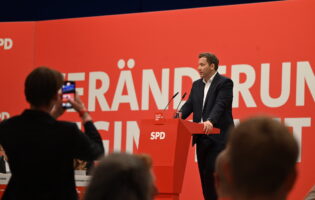Seriousness and Wish for Unity

Andreas Nick
German Bundestag
Andreas Nick has been a CDU member of the German Bundestag since 2013. He serves on the Committee on Foreign Affairs and is rapporteur for the Council of Europe, the United Nations, issues of global order and cybersecurity, as well as regional rapporteur for Turkey, Hungary, and South America. In addition, he is a substitute member of the Finance Committee and the Digital Agenda Committee. Dr. Nick was elected to the Bundestag following a professional career in banking. His final positions were as head of M&A at Sal. Oppenheim Jr. and Cie. and as professor of corporate finance at the Frankfurt School of Finance and Management. Dr. Nick holds a Master’s Degree and a Doctorate in business administration from WHU Otto Beisheim School of Management in Vallendar, as well as a Master of International Public Policy (MIPP) from the Paul H. Nitze School of Advanced International Studies (SAIS) of the Johns Hopkins University in Washington, DC.
For the army of journalists and media workers – at least equaling in headcount, if not outnumbering, the 1,000 party delegates – the annual CDU party conference in Leipzig was probably disappointing in some respect. None of the issues observers had considered to potentially trigger major controversies worth reporting about – minimum wage, the multi-pillar school system, even child care benefits – proved able to really enrage divisive debates.
Against the background of the European debt crisis, a sense of seriousness was clearly prevailing under the glass roofs of the Messe – a visible landmark for East German revival after unification in the city of Leipzig, epicenter of the East German revolution of 1989 – that left no real desire for potentially divisive intra-party ideological debates. The party gathering under the motto “For Europe. For Germany” clearly reflected both a sober tone of responsibility, probably appropriate given the serious challenges at hand on the EU level, as well as a strong desire to demonstrate party unity in challenging times.
Angela Merkel’s keynote speech clearly set the serious tone here, displaying a sense of responsibility and persistence, reiterating the Leitmotiv of a clear “Kompass” of firm values, while also stressing a flexible approach in responding to the real challenges of a changing world. In probably one of the strongest and most substantial speeches of the conference, Defense Minister Thomas de Maiziere philosophically elaborated on this modern understanding conservatism, describing it as firm on objectives but flexible in the choice of appropriate instruments used to pursue them.
It probably foreshadowed the main theme of Angela Merkel’s re-election bid in 2013, presenting herself as the reliable crisis manager at the heart of Europe and responsible guardian of Germany’s interests. The audience’s response signaled a clear willingness of party activists to go along with this, although the applause for Merkel’s speech – as frequently in this format -seemed more compliant than enthusiastic.
In contrast, an almost emotional outburst of applause and spontaneous standing ovations by party delegates was directed to Finance Minister Wolfgang Schaeuble for his forceful pro-European appeal – given in immediate response to one of the few dissidents on the EFSF in the Bundestag. This erased any remaining shadow of doubt about the party’s over-whelming support for the pro-European position, as reflected in the party conference’s main resolution calling for more European integration in fiscal and budget affairs. Werner Langen, leader of the CDU MEPs in the European Parliament, who largely led the conference through the debate on Europe, also voiced strong criticism for the German Constitutional Court’s recent ruling on the 5% threshold in German EP elections.
Little space was given to the Bavarian sister party CSU, whose leader, Horst Seehofer, only appeared for the Monday party dinner to deliver a short and little-noticed greeting – instead of the more traditional keynote address of the CSU leader, which had usually dominated the second day of any CDU conference when delivered by political heavyweights like Franz Josef Strauss or Edmund Stoiber.
Merkel’s junior coalition partner, the FDP, was hardly mentioned at all in Leipzig, in almost demonstrative neglect. The strong demonstration of support for Merkel’s and Schaeuble’s handling of the European debt crisis stood in remarkable contrast to the internal divisions haunting the FDP at its own party conference on the eve of the Leipzig gathering. Even more revealing, the way the CDU settled its debate on the minimum wage issue – without making any reference to the coalition partner’s conflicting position on the subject – may underline the perception of the FDP’s increasing insignificance and anticipated irrelevance in the aftermath of the 2013 election.
Consequently, what became even more apparent in Leipzig was a likely CDU strategy for 2013: Strong focus on Merkel as the undisputed party leader, portraying her as the reliable and steady hand steering Germany and Europe through turbulent times – while pragmatically lowering the hurdles on symbolic issues for potential new coalition requirements with either SPD (minimum wage) or Greens (energy), should voters deny red-green a majority in the next Bundestag and, therefore, bring Merkel back in play for a third term as Chancellor.
Merkel’s political fate is therefore clearly tied to the future development on the European stage; her challenge will be to convince German voters that her European strategy is working successfully, while also making herself appear indispensable for its solution going forward.









